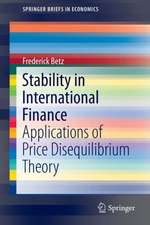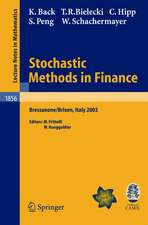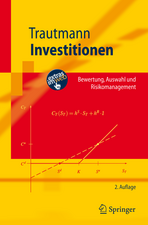Credit Risk: Modeling, Valuation and Hedging: Springer Finance
Autor Tomasz R. Bielecki, Marek Rutkowskien Limba Engleză Hardback – 20 noi 2001
| Toate formatele și edițiile | Preț | Express |
|---|---|---|
| Paperback (1) | 737.26 lei 6-8 săpt. | |
| Springer Berlin, Heidelberg – 5 dec 2010 | 737.26 lei 6-8 săpt. | |
| Hardback (1) | 742.97 lei 6-8 săpt. | |
| Springer Berlin, Heidelberg – 20 noi 2001 | 742.97 lei 6-8 săpt. |
Din seria Springer Finance
- 13%
 Preț: 359.68 lei
Preț: 359.68 lei - 24%
 Preț: 703.48 lei
Preț: 703.48 lei - 18%
 Preț: 787.15 lei
Preț: 787.15 lei - 19%
 Preț: 501.57 lei
Preț: 501.57 lei - 24%
 Preț: 809.78 lei
Preț: 809.78 lei - 17%
 Preț: 361.17 lei
Preț: 361.17 lei - 24%
 Preț: 605.31 lei
Preț: 605.31 lei - 17%
 Preț: 398.82 lei
Preț: 398.82 lei - 15%
 Preț: 649.06 lei
Preț: 649.06 lei - 18%
 Preț: 937.37 lei
Preț: 937.37 lei - 15%
 Preț: 659.85 lei
Preț: 659.85 lei - 18%
 Preț: 801.17 lei
Preț: 801.17 lei -
 Preț: 387.75 lei
Preț: 387.75 lei - 18%
 Preț: 1108.36 lei
Preț: 1108.36 lei - 15%
 Preț: 651.19 lei
Preț: 651.19 lei - 15%
 Preț: 658.88 lei
Preț: 658.88 lei - 18%
 Preț: 1112.60 lei
Preț: 1112.60 lei - 18%
 Preț: 937.86 lei
Preț: 937.86 lei -
 Preț: 418.34 lei
Preț: 418.34 lei -
 Preț: 398.15 lei
Preț: 398.15 lei - 15%
 Preț: 597.01 lei
Preț: 597.01 lei - 15%
 Preț: 637.89 lei
Preț: 637.89 lei - 18%
 Preț: 939.62 lei
Preț: 939.62 lei - 15%
 Preț: 632.19 lei
Preț: 632.19 lei - 18%
 Preț: 737.26 lei
Preț: 737.26 lei -
 Preț: 385.84 lei
Preț: 385.84 lei - 18%
 Preț: 892.90 lei
Preț: 892.90 lei -
 Preț: 395.25 lei
Preț: 395.25 lei - 15%
 Preț: 497.45 lei
Preț: 497.45 lei - 15%
 Preț: 644.95 lei
Preț: 644.95 lei - 18%
 Preț: 1207.45 lei
Preț: 1207.45 lei - 18%
 Preț: 810.81 lei
Preț: 810.81 lei -
 Preț: 391.61 lei
Preț: 391.61 lei - 19%
 Preț: 506.25 lei
Preț: 506.25 lei - 18%
 Preț: 957.62 lei
Preț: 957.62 lei -
 Preț: 387.75 lei
Preț: 387.75 lei - 15%
 Preț: 503.37 lei
Preț: 503.37 lei - 15%
 Preț: 593.91 lei
Preț: 593.91 lei -
 Preț: 383.71 lei
Preț: 383.71 lei
Preț: 742.97 lei
Preț vechi: 906.06 lei
-18% Nou
Puncte Express: 1114
Preț estimativ în valută:
142.16€ • 148.44$ • 117.40£
142.16€ • 148.44$ • 117.40£
Carte tipărită la comandă
Livrare economică 15-29 aprilie
Preluare comenzi: 021 569.72.76
Specificații
ISBN-13: 9783540675938
ISBN-10: 3540675930
Pagini: 524
Ilustrații: XVIII, 501 p.
Dimensiuni: 155 x 235 x 34 mm
Greutate: 0.89 kg
Ediția:1st ed. 2002. Corr. 2nd printing 2001
Editura: Springer Berlin, Heidelberg
Colecția Springer
Seria Springer Finance
Locul publicării:Berlin, Heidelberg, Germany
ISBN-10: 3540675930
Pagini: 524
Ilustrații: XVIII, 501 p.
Dimensiuni: 155 x 235 x 34 mm
Greutate: 0.89 kg
Ediția:1st ed. 2002. Corr. 2nd printing 2001
Editura: Springer Berlin, Heidelberg
Colecția Springer
Seria Springer Finance
Locul publicării:Berlin, Heidelberg, Germany
Public țintă
ResearchCuprins
1. Introduction to Credit Risk.- 2. Corporate Debt.- 3. First-Passage-Time Models.- 4. Hazard Function of a Random Time.- 5. Hazard Process of a Random Time.- 6. Martingale Hazard Process.- 7. Case of Several Random Times.- 8. Intensity-Based Valuation of Defaultable Claims.- 9. Conditionally Independent Defaults.- 10. Dependent Defaults.- 11. Markov Chains.- 12. Markovian Models of Credit Migrations.- 13. Heath-Jarrow-Morton Type Models.- 14. Defaultable Market Rates.- 15. Modeling of Market Rates.- References.- Basic Notation.
Recenzii
From the reviews:
T.R. Bielecki and M. Rutkowski
Credit Risk
Modeling, Valuation and Hedging
"A fairly complete overview of the most important recent developments of credit risk modelling from the viewpoint of mathematical finance . . . It provides an excellent treatment of mathematical aspects of credit risk and will also be useful as a reference for technical details to traders and analysts dealing with credit-risky assets. It is a worthwhile addition to the literature and will serve as highly recommended reading for students and researchers in the subject area for some years to come."
—MATHEMATICAL REVIEWS
"The main purpose of this outstanding monograph is to present a comprehensive survey of the existing developments in the area of credit risk research, as well as to put forth the most recent advancements in this field. An important feature of this book is its attempt to bridge the gap between the mathematical theory of credit risk and the financial practice. ... The content of this book provides an indispensable guide to graduate students, researchers, and also to advanced practitioners in the fields ... ." (Neculai Curteanu, Zentralblatt MATH, Vol. 979, 2002)
T.R. Bielecki and M. Rutkowski
Credit Risk
Modeling, Valuation and Hedging
"A fairly complete overview of the most important recent developments of credit risk modelling from the viewpoint of mathematical finance . . . It provides an excellent treatment of mathematical aspects of credit risk and will also be useful as a reference for technical details to traders and analysts dealing with credit-risky assets. It is a worthwhile addition to the literature and will serve as highly recommended reading for students and researchers in the subject area for some years to come."
—MATHEMATICAL REVIEWS
"The main purpose of this outstanding monograph is to present a comprehensive survey of the existing developments in the area of credit risk research, as well as to put forth the most recent advancements in this field. An important feature of this book is its attempt to bridge the gap between the mathematical theory of credit risk and the financial practice. ... The content of this book provides an indispensable guide to graduate students, researchers, and also to advanced practitioners in the fields ... ." (Neculai Curteanu, Zentralblatt MATH, Vol. 979, 2002)
Notă biografică
1
Textul de pe ultima copertă
Mathematical finance and financial engineering have been rapidly expanding fields of science over the past three decades. The main reason behind this phenomenon has been the success of sophisticated quantitative methodologies in helping professionals to manage financial risks. The newly developed credit derivatives industry has grown around the need to handle credit risk, which is one of the fundamental factors of financial risk. In recent years, we have witnessed a tremendous acceleration in research efforts aimed at better apprehending, modeling and hedging of this kind of risk. One of the objectives has been to understand links between credit risk and other major sources of uncertainty, such as the market risk or the liquidity risk. The main objective of this monograph is to present a comprehensive survey ofthe past developments in the area of credit risk research, as well as put forth the most recent advancements in this field. An important aspect of this text is that it attempts to bridge the gap between the mathematical theory of credit risk and the financial practice, which serves as the motivation for the mathematical modeling studied in the book. Mahtematical developments are presented in a thorough manner and cover the structural (value-of-the-firm) and the reduced-form (intensity-based) approaches to credit risk modeling, applied both to single and to multiple defaults. In particular, the book offers a detailed study of various arbitrage-free models of defaultable term structures with several rating grades. This book will serve as a valuable reference for financial analysts and traders involved with credit derivatives. Some aspects of the book may also be useful for market practitioners with managing credit-risk sensitives portfolios. Graduate students and researchers in areas such as finance theory, mathematical finance, financial engineering and probability theory will benefit from the book as well. On the technical side, readers are assumed to be familiar with graduate level probability theory, theory of stochastic processes, and elements of stochastic analysis and PDEs; some acquaintance with arbitrage pricing theory is also
Caracteristici
1st book on the market presenting a comprehensive approach to the quantative risk modelling provides a mathematical platform for all sorts of applications related to financial products whose value is partially or entirely derived from credit risk related events Includes supplementary material: sn.pub/extras



























